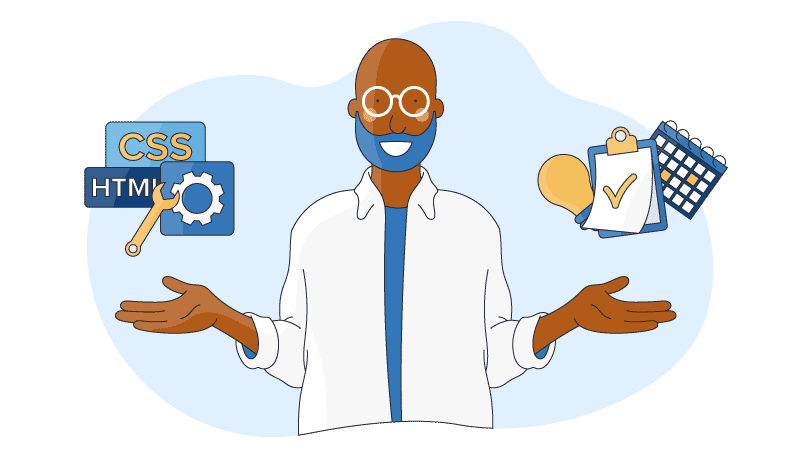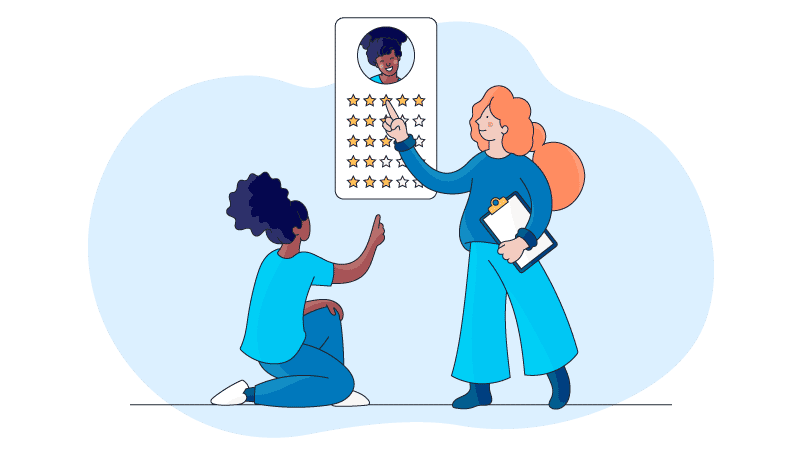Why career planning is essential for career resilience
Throughout most of history, the words ‘career planning’ would have made little sense. Careers were often pre-determined by location, social status, or gender.
The concept of choosing and planning a career was almost unheard of until the 1909 publication of, Choosing a Vocation,1 by Frank Parsons. It was a very short book. In a time when social mobility and career options were limited, all that could be said on the topic fitted neatly into 109 pages.
Fast forward to today, it's little wonder that the career planning and counseling industry is worth US$18.4bn2 globally, and is showing no sign of slowing. These days people can expect to change careers 3-73 times in their lifetime. And, amid rapid and unpredictable technological innovation people are now faced with the challenge of planning a career in uncertain times. The question is: in an age of constant change, is planning a career still necessary? After all, how do you plan for a future that feels impossible to predict? The answer is a resounding yes. While more flexibility is needed, career planning is still one of the most important ingredients to career success. In this article, we'll explain how to create a complete career plan, and how understanding your workstyle motivations with F4S is the jumping-off point.
What is career planning?
Career planning is the process of setting goals for your career, and setting a plan for how to get there. It involves assessing your skills, interests, and motivations, comparing them to present market needs, and then using this knowledge to plot your career path.
In the age of the Fourth Industrial Revolution, which is characterized by constant growth and change, career planning isn't a simple ‘one and done’. It requires an agile, dynamic approach. Constant skill and personal development, and adapting to evolving industries and technologies, always being ready to pivot when the labor market or other circumstances calls for it.
Why is career planning important?

In an age where the market is constantly shifting and changing, career planning is important to account for unexpected turns.
What happens if the career path you've meticulously planned becomes untenable? With a few adjustments to your career planning, you can shift with the changing times. Actively planning your career can positively impact your long-term success. Here are a few of the benefits and reasons why career planning is important:
Developing transferable skills

While technology evolves rapidly, the core skills and competencies that you develop while mastering them are often transferable.
Your complete career plan may not be straightforward, but the soft skills you develop along the way can be tweaked to fit different career choices.
For example, say you trained to be a graphic designer for print media. You spent years developing your design skills in tertiary education, but by the time you graduated, there was a steep decline in the number of print media publications and limited job prospects. While you specialized in design for print, you're still a graphic design whiz, and with a bit of UX/UI training, you can easily pivot into design roles for digital publications.
In short, you still build transferable career capital while setting your sights on a specific career path even if you need to change direction along the way.
Clarity and motivation
"A goal is not always meant to be reached; it often serves simply as something to aim at." - Bruce Lee
Career goals provide a sense of clarity, purpose, direction and energy. Having no clear career goals gives you the opposite. Simply put, you need plans and goals to think clearly and function at a high level. Achieving the goals themselves isn't necessarily the primary benefit. In many cases, the personal outcomes that come from being focused on achieving a goal are beneficial in and of themselves.
Along the way to achieving these goals, the personal growth you experience, the skills added to your tool belt and everything you gain along the way will improve your chances drastically when it comes to achieving your dream job, even if it isn't the dream job you originally planned for.
Having clear career goals also help you to navigate opportunities with purpose and direction, ensuring each step contributes meaningfully to your professional journey. That will enable you to tailor your cover letter, when actually applying for a position, aligning your experiences and aspirations with the requirements of the position you're applying for. This clarity helps convey authenticity and demonstrates to employers how the role fits into your overarching professional trajectory. To assist you further, explore some cover letter examples to refine your application strategies.
Gaining self-knowledge
In the process of actively pursuing career success, you'll often learn things about yourself that you wouldn't while just plodding along. You're testing yourself, pushing yourself to do better and developing skills. You're also finding out what you are, and aren't good at. What you do, and don't like. All of this is valuable information that will empower you to make the right moves when the time comes.
So, with definitions and benefits out of the way, it's time to start the process of career planning.
What are the steps in your career planning process?
Here is our 5-step process for career planning:
- Invest time in a self-assessment
- Identify your skills, strengths, and weaknesses
- Clarify your values and interests
- Research career options
- Create and execute your career development plan

Ready to dive into your career strategy? Whether you're looking for more job satisfaction than your current role offers, some career advice for your job search, or you're doing some career exploration, here is our 5-step process for getting career planning right.
Step 1: Invest time in self-assessment
Understanding your personality traits, your behavioral tendencies and workstyle motivations is one of the essential first steps in career planning. Without understanding who you are, you might fall into the unfortunate trap of planning a career based on somebody else's ideal, not your own.
Luckily, there are several measures of personality that you can use as tools to begin your career planning journey.
MBTI (Myers-Briggs Type Indicator) Personality Test
The MBTI is a well-known personality evaluation that categorizes individuals into one of 16 personality types. It measures preferences in areas such as extraversion vs. introversion, sensing vs. intuition, thinking vs. feeling, and judging vs. perceiving. For instance, if you're an extroverted, intuitive, perceptive person who tends to think their decisions through rationally, according to the MBTI, you are an ENTP (Extraverted, Intuitive, Thinking, Perceiving).
While this test can be a great start, when it comes to career planning it isn't workplace-specific and can be considered too generalized.
Fingerprint For Success
Fingerprint for Success (F4S) is a free personal development and coaching platform that is built on 20 years of scientific research. Beginning with a brief survey that outlines your workstyle motivations, you'll get a comprehensive overview of what makes you tick at work, areas that you need to improve to reach your career goals, and benchmarking tools that lay out the motivations of others who have achieved success.
You can even use F4S world first AI Coach Marlee to develop the traits you need to reach your career goals!

DISC Assessment
The DISC assessment focuses on an individual's behavioral tendencies and communication styles. It categorizes individuals into 4 primary personality types: Dominance (D), Influence (I), Steadiness (S), and Conscientiousness (C).
This personality evaluation helps by identifying your dominant style, allowing you to better understand how you interact with others, handle challenges, and contribute to teams.
Enneagram
The Enneagram is a personality framework that describes 9 distinct personality types, each with its own motivations, fears, and core desires. By identifying your Enneagram type, you gain insights into your emotional patterns and can use this knowledge to make career choices. The Enneagram is used for personal and professional development, but again, it isn't made specifically for work.
Step 2: Identifying your skills, strengths, and weaknesses (which we call blind spots)
Now that you've understood your personality, drives and motivations, the next step is to take stock of what you're good at, and areas where you could improve. These may be hard skills skills that you've accrued through formal education or years of experience, or soft skills.
Soft skills often aren't tied to an area of expertise. Rather, they're developed through experience working with others, and often encompass things such as:
- Communication skills
- Collaboration
- Adaptability
- Problem-solving
- Time management
- People management
- Leadership
- Emotional intelligence
And when it comes to smart career planning, soft skills matter. According to LinkedIn's 2023 Most In-Demand Skills report,4 the most needed skills are soft skills, like time management, communication skills, leadership and collaboration.
This doesn't mean your degree in statistics doesn't count. Rather, when you're making an inventory of your strengths and weaknesses, remember things like communication, or problem-solving. Especially if landing a leadership role is part of your career plan over time.
If you're the type of person who struggles to identify things you're good at, F4S can help with that, too. You can understand your Communication Style (Affective or Neutral), Action Direction (Goal Orientated, Problem Orientated) and then, by comparing your results with people whose career you'd like to emulate, you'll have a much better idea of how to reach your goals.
Personalized insights for your goal

You like some variety, radical changes, doing new and different things in some of your work or business.

With a little bit of development you can become more socially aware of yourself and others.
Step 3: Clarifying your values and interests
This is a vital, but often sadly overlooked aspect of career planning. But it's worth noting that when it comes to really succeeding in your chosen path, your best bet is to choose something that you genuinely love, and care about.
Landing in a career you're not passionate about won't just be boring. You're also far less likely to succeed. So, to increase your chance of success, be sure to spend time clarifying what you value, and what interests you.
Spend some reflecting on what these are. Depending on your decision inputs, you may want to use a whiteboarding tool to map these out, write them down, or talk them through with a close friend, colleague or mentor.
Step 4: Research different career options
Doing in-depth research on high-growth industries is the next important step in career planning. Finding out where the most emerging job roles are, and other markers of job prospects is a great place to start. If earning a lot of money is important to you, it's worth researching what kind of salary you can expect to earn throughout your career.
If you have concerns about job security, research which transferable skills you can develop to future-proof yourself.
Remember, soft skills will always be relevant, so be sure to hedge against uncertainty, choosing a career where you can develop these skills.
Step 5: Create, and execute your career development plan
Now that you've got a solid understanding of what jobs are out there that suit your workstyle motivations, values, goals and personality, it's time to create your career action plan. Follow these steps to go from ideation to execution.
Outlining the steps to reach career goals
Start by clearly defining your career goals and objectives. Determine what you want to achieve in the short term and long term. Break down these goals into smaller, manageable steps. Identify the specific skills, qualifications, and experiences you need to reach each goal.
Identify education training opportunities
Consider the resources you'll need to support your career journey. This may include additional training opportunities, online courses, or certifications to enhance your skill set. Evaluate the costs associated with obtaining these qualifications and whether any licenses or permits are required to practice in your chosen field.
Utilize professional associations and networking events
Joining professional associations related to your industry provides valuable networking opportunities. Attend industry-specific events, conferences, and workshops to connect with like-minded professionals. These connections offer insights, mentorship, and potential career opportunities.
Execution and continuous improvement
Once your career action plan is in place, it's time to execute your plan diligently. Continue to develop your skills, network, and stay up-to-date with your chosen industry. Regularly assess your progress and make adjustments as needed. Adapt to changes and challenges as they arise.
Remember that a career action plan is dynamic. It should evolve as your career progresses. By following these steps and using available resources, you'll be better equipped to reach your career goals and ensure your career aligns with your aspirations and values.
Career planning success stories
Need a bit of inspiration to get the ball rolling? Here are some incredible success stories of the power of career planning and where it can take you.
Arnold Schwarzenegger
From growing up in a small farming town in Austria to becoming a world champion bodybuilder, to being one of the most highly paid actors on the planet, to then becoming Governor of California, Arnold Schwarzenegger might have had the most incredible, and unlikely career of anybody in history.
How did he do it?
According to Schwarzenegger, a key ingredient to his success is his ability to visualize his goals clearly.
He insists that there isn't any magic to this. Rather, he visualizes his goal, and uses that image as a guide to help him make the right decisions on how to reach it.5
Barack Obama
From a grassroots community organizer to the first African-American President of the United States, Barack Obama's success has been marked by evolution, growth and planning.
Obama's career started as a community organizer in Chicago. Here, his worldview and motivation to make a difference were solidified. Realizing that he could only do so much on the ground, he enrolled in Harvard Law School where he excelled academically, and became a civil rights attorney.
Here, he was able to make more impact, but again, Obama set his sights on bigger things. He was elected to the Illinois State Senate, then the U.S. Senate representing Illinois, and then President of the United States.
At every turn, Obama shifted his sights on where he could create more impact and did what was needed to get there. Unsurprisingly, this strategy led him to increasingly influential positions, and ultimately to become one of the most beloved U.S. Presidents.
Malala Yousafzai
As the youngest-ever Nobel Peace Prize winner, Malala’s career as an activist for women’s education began at a young age. Her father was a school principal, and a passionate advocate for women’s education, and the apple didn’t fall far from the tree. She long planned to become a politician, and be a pioneer for women’s educational rights.
As an 11-year-old girl, this goal was still well out of reach, but when she had the opportunity to write for the BBC, anonymously, about the realities of Pakistani girls' education, she took it. She continued to fight for the right to education for years, until the Taliban attempted to assassinate her, at the age of 15.
After she was repatriated to the United Kingdom, Malala miraculously recovered. Emboldened by her experience, she continued to pursue her activism, became a best-selling author, and the youngest recipient of the Nobel Peace Prize, and an inspiration to women around the world.
FAQs

Why is career planning essential for establishing your professional career?
Career planning is the process of defining your long-term goals and creating a roadmap to achieve them. Career planning is crucial for shaping your professional career by helping you identify the ideal career path and spot opportunities for growth.
How do I identify advancement opportunities to reach my ideal career path?
Identifying advancement opportunities is a key part of career planning. Actively staying attuned to industry trends, networking with professionals, and seeking advice from mentors can help you spot opportunities for additional career growth that align with your chosen path.
What is the easiest way to stay informed about job openings in my chosen field?
The easiest way to stay informed about job opening is by actively networking with professionals, using online job boards, and registering with industry-specific websites. These actions not only help you stay informed about job openings but also contribute to your broader objectives of career planning by allowing you to spot opportunities for career advancement.
Find out where your industry's ‘water cooler’ is and hang out there. Here, you'll find a lot of professional opportunities and networking opportunities to help you land the right job roles you're looking for.
What are the key questions to ask yourself before planning a career?
Here is a list of the key questions to ask yourself before beginning the process of career path planning:
- Is my current role in line with my long term career goals?
- What life skill do I currently have that will lend itself to my career goals?
- What is the best possible next career step that will bring me closer to my goals?
- What are the potential outcomes of my career plan that I am most excited about?
- Do I want a secure position, or am I willing to take bold risks to reach my goals.
- What job roles are best suited to me?
- What job roles would I most love to have?
- Am I willing to work an entry-level role to get experience?
- What amounts of time am I willing to put into preparing for my career
- Am I willing to plan over time to make my dream job a reality?
- Am I willing to take bold risks, if I need to?
Whether you're at the beginning of your career, or looking for a change, asking yourself the right questions is a great way to get the ball rolling.
I feel trapped in my current position, what can I do?
Many people feel trapped in their current situation at work. This is especially the case if you have a secure position, even if it is not exactly what you want to do. Thankfully, there are lots of ways to solve this problem. For example, if you have the time and energy, you can seek out education opportunities, or online courses that you can do while working full-time.
Or, you can seek the help of a career counselor or coach, inquire about job shadowing or finding out about other options. There may be many career fields that are available where your current skills are transferable. With training, there may be a range of additional opportunities that will present themselves.
So if you feel trapped in your current position, don't fret! You don't have to make dramatic career changes or take bold risks. Simply using the skills that you have, and upgrading your skill set may be all you need to do to make a change.
What are career reviews and why are they important?

Career reviews, also known as career assessments or career evaluations, are systematic processes for individuals to assess and reflect on their careers, goals, and progress. Career reviews involve a comprehensive self-analysis of your current career situation, as well as planning and strategizing for your future career development. These reviews take various forms and may be conducted periodically throughout your career journey.
What are the types of career capital?
There are 3 types of career capital to consider before making any career step. Understanding these should inform your career strategy. They are skills, connections, and credentials.
Skills
Before making any career step, consider what skills you'll learn in the role, and what returns on career capital you'll gain from investing in these skills. Take advantage of every professional development opportunity that your current role offers and make sure training is in line with your future career goals.
Connections
Before accepting a new role, consider the kinds of networking options that will be available. One of the major returns on career capital you can expect is when you have a network that grows with you, and can recommend you to others within your industry.
Credentials
Consider what credentials, or formal qualifications you need before executing your career plan. Your credentials will be useful throughout your entire career, and have a major impact over time.
Education, training and the process of certification is one of the most important components in career planning. Does your current position support your goals for education? More importantly, will the company pay for further education? If so, you can expect a high return on career capital by investing your time working for a company that actively increases your career capital.
Kick off your career planning journey with F4S
Career planning can be a challenge, but with the right tools you can take the guesswork and anxiety out of career planning and just get started. That's where F4S comes in. Based on more than 20 years of rigorous research on what leads to entrepreneurial success, F4S helps you understand yourself at work, your strengths and blindspots, and ultimately, empowers you to be your best self. Ready to get started?
Recommended program for you:
Our expert coaches developed this program to help you achieve crazy big goals, or learn how to inspire others to. This is especially helpful for leaders or anyone wanting to achieve awesome things in work and life.
Coach Marlee (your amazing AI-powered personal coach) will analyse your unique traits and goals to personalize the program so you see results as quickly as possible.
Testimonials

“Trust Your Gut coaching program helped me build deeper levels of self-esteem and how I valued myself vis-a-vis the greater world. It also taught me courage to believe in my beliefs, and that it is not about success or failure, but that we give it a go, a try”

“Always thought-provoking and well worth my time”

“I learned to be organised and to have clarity of my target”

“This program helped me kickstart my journey to wellbeing. Never could I have imagined an AI coach being this good - as if you're talking to a real human and how Marlee made me accountable to my goals. Super awesome experience that you definitely got to try!”

“Marlee helped me build deeper levels of self-esteem and how I valued myself vis-a-vis the greater world. It also taught me courage to believe in my beliefs, and that it is not about success or failure, but that we give it a go, a try”

“I learned to manage my stress about details”

"With attention to detail program, I learned a whole new way to see and approach projects"

“Awesome and effective coaching program of helping to increase motivation for goal challenged people. Fallen in love with goals and looking forward to more BHAGs. Highly recommend the coaching for GoalCatcher!”
1. Parsons P, 1909, Choosing a Vocation, Open Library, https://openlibrary.org/books/OL7042543M/Choosing_a_vocation
2. Ibis World, 2023, Job Training & Career Counseling in the US - Market Size (2005-2029), Ibis World https://www.ibisworld.com/industry-statistics/market-size/job-training-career-counseling-united-states/
3. University of Queensland, 2023, How many careers changes in a lifetime?, University of Queensland, https://study.uq.edu.au/stories/how-many-career-changes-lifetime#:~:text=Research%20shows%20most%20people%20will,and%20upcoming%20generations%20of%20workers
4. Dewar J, 2023, The most in demand skills for 2023, LinkedIn, https://www.linkedin.com/business/talent/blog/talent-strategy/linkedin-most-in-demand-hard-and-soft-skills
5. Schwarzenegger A, 2013, Total Recall: My Unbelievable True Life Story, Simon & Schuster, https://www.amazon.com.au/Total-Recall-Arnold-Schwarzenegger/dp/1849839735/ref=asc_df_1849839735/?tag=googleshopdsk-22&linkCode=df0&hvadid=341772748765&hvpos=&hvnetw=g&hvrand=10745035621494246894&hvpone=&hvptwo=&hvqmt=&hvdev=c&hvdvcmdl=&hvlocint=&hvlocphy=9071757&hvtargid=pla-452751446380&psc=1
6. Obama B, 2008, The Audacity Of Hope: Thoughts on Reclaiming the American Dream, Text Publishing, https://www.amazon.com/s?k=the+audacity+of+hope+by+barack+obama
Related Articles
What’s your communication style?
Learn how to connect with colleagues and boost workplace motivation.

Name Surname
Position, Company name

Name Surname
Position, Company name

Name Surname
Position, Company name

Name Surname
Position, Company name

Name Surname
Position, Company name

Name Surname
Position, Company name
Your submission has been received!

Hack your wellbeing, productivity and goals
Programs are created by expert coaches & delivered by our incredible A.I. Coach Marlee. Sessions only take 5-15 minutes and are 100% personalized to fit your unique traits and goals.
